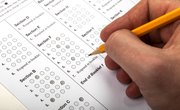A criterion-referenced test is designed to measure how well test takers have mastered a particular body of knowledge. The term "criterion- referenced test" is not part of the everyday vocabulary in schools, and yet, nearly all students take criterion-referenced tests on a routine basis. These tests generally have an established "passing" score. Students know what the passing score is and an individual's test score is determined by knowledge of the course material.
It is important to distinguish between criterion-referenced tests and norm-referenced tests. The standardized tests used to measure how well an individual does relative to other people who have taken the test are norm-referenced.
Mastery of Subject Matter.
Criterion-referenced tests are more suitable than norm-referenced tests for tracking the progress of students within a curriculum. Test items can be designed to match specific program objectives. The scores on a criterion referenced test indicate how well the individual can correctly answer questions on the material being studied, while the scores on a norm-referenced test report how the student scored relative to other students in the group.
Criterion-Referenced Tests can be Managed Locally.
Assessing student progress is something that every teacher must do. Criterion-referenced tests can be developed at the classroom level. If the standards are not met, teachers can specifically diagnose the deficiencies. Scores for an individual student are independent of how other students perform. In addition, test results can be quickly obtained to give students effective feedback on their performance. Although norm-referenced tests are most suitable for developing normative data across large groups, criterion-referenced tests can produce some local norms.
Disadvantages of Criterian-Referenced Tests
Criterion-referenced tests have some built-in disadvantages. Creating tests that are both valid and reliable requires fairly extensive and expensive time and effort. In addition, results cannot be generalized beyond the specific course or program. Such tests may also be compromised by students gaining access to test questions prior to exams. Criterion-referenced tests are specific to a program and cannot be used to measure the performance of large groups.
Analyzing Test Items
Item analysis is used to measure the effectiveness of individual test items. The main purpose is to improve tests, to identify questions that are too easy, too difficult or too susceptible to guessing. While test items can be analyzed on both criterion-referenced and norm-referenced tests, the analysis is somewhat different because the purpose of the two types of tests is different.
Items on norm-referenced tests need to discriminate between high and low performers because those tests are generally used to make aptitude, proficiency or placement decisions. Criterion-referenced tests, in contrast, are used to measure mastery of specific material and the goal is success for all students. The best items on criterion-referenced tests are those that tap the important concepts.
Related Articles
References
Writer Bio
Based in Boise Idaho, Sharon O’Toole has over 20 years experience writing for business and industry. She has worked in the areas of education, technology and publishing. She holds an editing certification, expert level, conferred by Expert Rating Global Certifications and a Master’s degree from Leicester University, UK.











